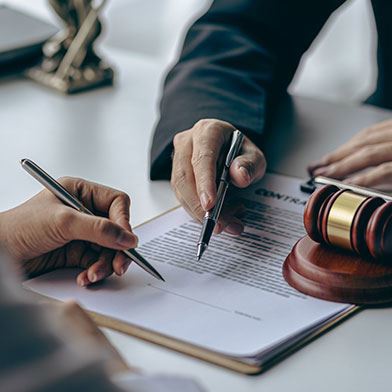


Citrus County Violent Crime Attorney
Experienced Defense Against Violent Crime Charges in Florida
Facing violent crime charges can have serious implications for your future. An experienced attorney can provide the strategic and personalized legal representation you need to defend yourself against serious charges and help you build a case to protect your rights and interests in court.
Every detail counts when your livelihood, reputation, and freedom are on the line. Work with our experienced attorney, Bryan Caughey, to find guidance and representation for you every step of the way.
Have you been accused of a violent crime? Call Caughey Law, PLLC today at (352) 645-2215 to schedule a consultation with our violent crime lawyer in Citrus County.

Whether you have questions or you’re ready to get started, our legal team is ready to help.
Types of Violent Crimes in Florida
Examples of violent crimes include:
- Assault
- Battery
- Burglary
- Domestic violence
- Robbery
- Manslaughter
- Sex offenses
- Weapon offenses
What is the Most Common Violent Crime in Florida?
The most common violent crime arrest is for misdemeanor domestic battery. It is a first-degree misdemeanor and punishable by up to a year in the county jail. The elements of misdemeanor battery are that the accused intentionally touched or struck the victim against the victim’s will. Note that injury or damage is not an element, and so doesn’t have to be proven by the State. The case law interpreting the charge allows for any unwanted touching, however slight, to qualify for the offense. A common fact pattern for domestic battery is that one or both parties of a couple has had too much to drink, and an argument starts, the soon to be defendant grabs the other’s arm to make a point, or to prevent them from leaving the argument, and that person calls law enforcement to get the other to leave to calm down. Law enforcement arrives and sees a slight bruise or redness on the complainant, asks why they were called, and then will make an arrest. This conduct, though not intending to cause harm, qualifies under the law for the charge of domestic battery.
What Happens After a Domestic Battery Arrest?
Once an arrest is made for domestic battery, Florida Law mandates that the accused be held at a no bond until the case is reviewed by a judge at First Appearance. Once reviewed, the judge has broad discretion to set a bond amount and conditions. Commonly, the judge will impose a no-contact order as a condition of bond, meaning that the accused cannot return home, assuming the couple lives together, or talk about anything even through a third party. This condition exists until the case is closed. If you are subject to a domestic no-contact, a violation is a new misdemeanor crime, violating a condition of pretrial release, and is cause for the State, or the judge, to revoke your bond. This means you would have to wait in jail until your case resolves. It is important to note that battery charges are enhanceable if the accused has a prior battery conviction. This means that misdemeanor conduct can be enhanced to the felony charge of battery- second offense, a third-degree felony, if the State is able to prove the accused has a prior battery conviction. Florida Prosecutors are told to take domestic battery charges very seriously and so, it is imperative to have an experienced attorney working on your case to get the best outcome available.
Any domestic violence conviction, even a misdemeanor, can make the defendant a federally prohibited person to own and possess firearms for life under the Gun Control Act of 1968. Because crimes of domestic battery are ineligible for sealing and expungement, the prohibition for possessing firearms is for life. This is a frequently overlooked collateral consequence of a domestic battery charge.
What is Considered Domestic Battery By Strangulation?
Moving up in severity from misdemeanor battery and the felony charge of battery- second offense is felony domestic battery by strangulation. The elements of this charge are that the defendant 1) knowingly and intentionally impeded breath or circulation of blood by applying contact to the throat or neck, nose, or mouth of the victim, 2) created a risk of or caused great bodily harm, and that 3) the victim was a family or household member or in a dating relationship with the defendant. This is a third-degree felony, punishable by up to 5 years in prison, and is a level 6 offense on the scoresheet. A level 6 offense is worth 36 points on the scoresheet, before any victim injury points or prior record points are added. This means that one can score mandatory prison very easily based on this charge.
The crux of a domestic battery by strangulation case often lies in whether the State and law enforcement can prove element 2) creating a risk of or causing great bodily harm. Absent EMS records or medical testimony it can be very challenging, though not impossible, for the State to prove this element. Simply touching the victim’s neck or face, does not automatically equate to a strangulation conviction despite the arrested, or filed, charge. Conducting a precision deposition and going through the discovery process with an experienced attorney can help uncover these nuanced shortcomings in this very technical charge.
Crimes Of Violence Including Weapons & Firearms
The most serious crimes of violence involve weapons and firearms. This is both for the very real potential for death or serious bodily injury and because the alleged possession or use of a firearm during an offense invokes Florida’s 10-20-life law, and PRR or HFO enhancements along with severe minimum mandatories, as discussed in our enhancements page. Aggravated assault with a deadly weapon is the most common weapons charge, and the involved conduct is that the accused intentionally put the victim in fear of imminent violence using a deadly weapon. The imminence of the violence and the ability of the defendant to carry out the threat is often the factual analysis that needs to be completed. For example, a conditional threat, ‘next time you come over here I’ll beat you with a baseball bat’, is not imminent, and a threat of ‘I’ll shoot you right now’, if the accused has no ready access to a firearm would likely not qualify for the charge either. The deadly weapon component can also require a more in depth analysis in the case of an unconventional item being weaponized- a BB gun for example.
Up one level in severity and in alleged actions is aggravated battery, either with great bodily harm or with a deadly weapon- both second-degree felonies, punishable by up to 15 years in prison. On the scoresheet, both score mandatory prison, even with no prior criminal history. While aggravated assault involves the putting in fear of, aggravated battery involves the intentional touching or striking. The threshold question for a great bodily harm charge is how the state proves great bodily harm and does the alleged injury qualify. This analysis again, deals heavily on medical records and testimony from expert witnesses. Case law has also guided the analysis, sometimes coming up with confusing outcomes. For example, a broken rib might not qualify as great bodily injury depending on the severity of the damage, but in some cases, a concussion can qualify- although there would need to be very specific medical testimony to support such an assertion to a jury. The definition of deadly weapon is “any object that will likely cause death or great bodily harm if used or threatened to be used in the ordinary and usual manner contemplated by its design and construction.” However, there is a second definition given in the jury instructions: “An object not designed to inflict bodily harm may nonetheless be a “deadly weapon” if it was used or threatened to be used in a manner likely to cause death or great bodily harm” that is given if a non-traditional weapon is used. This definition is ripe for exploration as a possible defense.
How To Defend Against Violent Crime Charges
A possible defense to any violent crime is self-defense and stand your ground. Although both self-defense and stand your ground are similar, self defense is an affirmative defense, and stand your ground is a claim of immunity, and so their application to a criminal case is very different. Self-Defense, being an affirmative defense, is an admission to the conduct, but an argument that one was justified in so acting. Self defense is raised to the jury at a trial and can result in a not guilty verdict. Stand your ground is guided by 776.032 Florida Statutes and is an immunity from prosecution. A stand your ground claim is litigated pre-trial to the judge under a different set of presumptions and burdens for each party. If you have been arrested or charged with a violent crime that may have a self-defense component, call Caughey Law to set up a consultation today.
While some offenses, such as a misdemeanor domestic battery charge, could result in fines and jail time, other violent offenses may have much more severe penalties. For example, theft, aggravated assault, battery with a deadly weapon that causes great bodily harm, domestic battery by strangulation, possession of a firearm by a convicted felon, firearm offenses, and sex offenses can become felonies and include large fines and long imprisonment time.
Contact Our Violent Crime Lawyer in Citrus County Today
Much is at stake when you are charged with a violent crime. In extreme cases, you could face life in prison or even the death penalty. It is crucial to have an attorney by your side as you go through this legal process. Caughey Law, PLLC is dedicated to defending our clients and fostering communicative relationships as we work together. Attorney Bryan Caughey has over a decade of experience and is devoted to working with clients and fighting for them in court.
Contact Caughey Law, PLLC, today to get started with out Citrus County violent crime attorney.

Bryan Caughey, the Logical Choice
With a violent crime charge, no matter how minor or major, life as you know it can be drastically changed. Caughey Law, PLLC is proud to offer experienced defense for our clients.
Attorney Bryan Caughey is dedicated to visiting the jail on a weekly basis to communicate with incarcerated clients and understanding their unique situation. With the support of our firm, you can rest assured knowing your case is being diligently handled with care.
Contact Our Offices
Whether you have questions or you’re ready to get started, our legal team is ready to help. Complete our form below or call us at (352) 645-2215.






